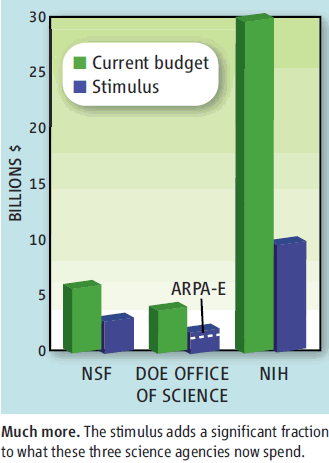|
|
|
|
|
|
|
News & Views item - March 2009 |
![]() Kim Carr Talks University Research. (March 9, 2009)
Kim Carr Talks University Research. (March 9, 2009)
 Federal
Senator Kim Carr, Minister for Innovation, Industry, Science and Research, today
addressed the Australian Financial Review Higher Education Conference
in Sydney: "I begin with two premises: First, that research is critical to
Australia's prosperity. Second, that the status quo is not good enough
to meet the challenges of the twenty-first century."
Federal
Senator Kim Carr, Minister for Innovation, Industry, Science and Research, today
addressed the Australian Financial Review Higher Education Conference
in Sydney: "I begin with two premises: First, that research is critical to
Australia's prosperity. Second, that the status quo is not good enough
to meet the challenges of the twenty-first century."
With the federal government's response to the Cutler Innovation Review in the offing, the nation's R&D sectors, in universities and elsewhere, are keenly awaiting the detail of just what is meant by "the status quo is not good enough to meet the challenges of the twenty-first century."
Early on in his address he notes: "Australia produces 3 per cent of the world’s
research papers with 0.3 per cent of the world’s population... it makes us no
better per capita than Canada, the United Kingdom or New Zealand, and rather
worse than the Scandinavians, Switzerland, Israel, and the Netherlands [and m]ost
of these countries are also well ahead of us on citation impact.
"We are already seeing evidence that Australia and its universities
are slipping in the global rankings... Nobody here needs to be reminded how much
pressure our universities have been under in recent times... Australia was the
only country in the OECD to cut public expenditure on higher education during
[the past decade]. Academic staff have been asked to do more teaching and more
administration, while still somehow keeping up with their research. The
condition of Australia’s university infrastructure has also been allowed to
deteriorate."
Senator Carr then makes what is a critical observation allowing an understanding of his view of the raison d'etra for university research: "Universities are critical to the national innovation system. If we want Australia's universities to contribute fully to our innovation effort - if we want them to compete successfully in the global arena - we must be ready to push for structural reform and cultural change."
The matter of our universities being the repositories and transmitters of learning and engaging in the furtherance of knowledge through fundamental research, and not just in the hard sciences, is not of equal importance but rather of secondary importance.
We believe that this is a short-sighted and destructive viewpoint. It leads to a dumbing down of the university sector by placing restrictions on the avenues of research and driving those with outstanding ability in fundamental research to become members of Australia's diaspora. Senator Carr is well known for his interpretation of the utility of tertiary education, and it would have been known to the Prime Minister, Kevin Rudd, when he appointed him Minister for Science and Research.
It has become clear that the relationship between the Rudd government and the university sector will be defined to a marked extent by whether or not Senator Carr continues as minister for science and research and if not, how will he be replaced.
Senator Carr also addressed the matter of indirect research costs:
An analysis commissioned by my department last year found that universities in countries comparable to ours receive anything from 35 cents to more than 70 cents in overhead funding for every dollar of project funding. Australian universities get 20 cents. This is well below the international benchmark of 50 cents in the dollar.
Then come the equivocation: Just how big the shortfall is we can't say with certainty, because we don't know exactly how much university research costs...
[But] If we don't do something about it... [w]e risk losing some of our
best scholars because we can't offer them research opportunities and
infrastructure comparable to what they can get elsewhere. We risk losing the
capacity to embark on the exploratory and speculative research that is
fundamental to innovation.
... it is our ambition to progressively address the gap in funding for the
indirect costs of research, subject to the capacity of future budgets.
With the dangling of a somewhat limp carrot, comes then the ill-defined stick. What effect that will have on the potential academic diaspora is at least debatable:
However, you don't get anything for nothing in this life, and in return, the government will expect universities to provide better, more meaningful data on research costs through activity-based reporting, and to meet specific performance targets to be developed in consultation with the sector.
The government will use any additional funding as a lever to:
* drive structural reform within institutions and across
the sector
* increase transparency and accountability
* ensure that resources are allocated rationally and used
efficiently
* make universities responsible for their decisions
* and improve the way universities manage their estate.
These are precisely the same ends we will expect to achieve through mission-based funding compacts. Each university will negotiate a compact with the government defining its particular mission, and describing how it will fulfil that mission and how it will meet the government's public policy objectives.
Senator Carr then turns to his vision of the university sector as a collection of hubs and spokes. How it is supposed to be implemented remains a matter of secret ministerial/bureaucratic business but we are assured that it:
will democratise access to human and physical resources. It will increase resource efficiency by minimising duplication and fragmentation. It will build capacity by bringing staff and students into a much closer creative dialogue with their colleagues in other institutions.
This reform will not be imposed from the top down. For the most part... we expect university departments and research centres to identify and negotiate their own alliances... [and to] progressively increase the number of research groups performing at world-class levels, as measured by international performance benchmarks.
Now if all this is beginning to look rather opaque, there's more:
This is where Excellence in Research for Australia [ERA] comes in. It will measure the quality of Australian research against the world's best. It will inspire better research and identify new research opportunities. It will tell us whether the work we are doing is really as good as we say it is. One way we can put ERA's assessments to the test is by seeing how well we go working with international researchers and institutions. And it will lift our research performance by concentrating resources and developing critical mass in areas of excellence and strategic importance.
 But mightn't it be far more effective if the Australian Research Council and the
National Health and Medical Research Council were actively encouraged by the
federal government to develop the world's most effective system of peer review
of research proposals. Australia would have a far better chance of achieving the
goal of "world-class research capabilities"
that Senator Carr espouses.
But mightn't it be far more effective if the Australian Research Council and the
National Health and Medical Research Council were actively encouraged by the
federal government to develop the world's most effective system of peer review
of research proposals. Australia would have a far better chance of achieving the
goal of "world-class research capabilities"
that Senator Carr espouses.
Of course doing so would relax the direct political grip on a significant portion of the nation's research something of which politicians are not overly enamoured.
The senator also said: it is the government's policy ambition that we double the level of collaboration between Australian businesses, universities, and publicly funded research agencies over the next decade. We want to see a 25 per cent increase in the proportion of businesses engaging in innovation over the next decade, and a continuing increase in the number of businesses investing in R&D. However, he gave no indication of how this would be fostered. The worry is that deleterious redirection of university resources rather than the provision of additional ones may be involved.
And finally Senator Carr turned to Australia's human resources: We will build a research workforce strategy for the period to 2020 to meet expected shortfalls in the supply of research-qualified university staff. At the same time, the government recognises that the level of support needs to increase to sustain Australian Postgraduate Award holders at a reasonable living standard. We will act on this as budget circumstances permit, but it is our policy ambition to significantly increase the number of students completing higher degrees by research over the next decade.
The bringing down of the 2009-10 budget is barely two months away, the second for this government, and it is hardly news that the economic climate is crucially different from a year ago. How well the university and research sectors will be supported, how long a view the government will take, and how tightly constrained the university and research sectors will be by Kim Carr's ideological shackles will become increasingly apparent.
Nevertheless the good news is, John Howard isn't calling the shots.